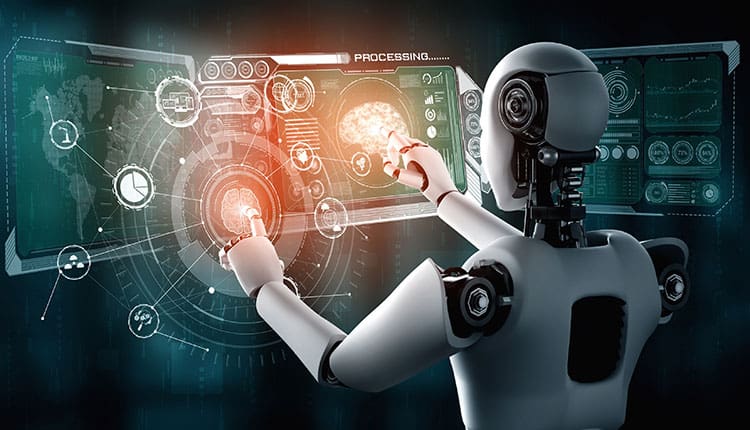
Artificial Intelligence is poised to permeate every industry and occupation—it’s almost like hygiene—but with increased processing power, server capacity, and widespread connectivity, the promise of AI has grown clearer and can no longer be ignored. According to reports, AI is estimated to increase business productivity levels by up to 40% by 2035.
How? Let’s go a bit deeper to analyze:
What is the role of technology in business growth?
The advent of technology has led to a revolution in business ideas and models. The new and improved methods of conducting business offer a quicker, more practical, and more effective means of carrying out business transactions.
Being able to reach a larger audience in the international market was made possible by technology. The most obvious example is the Internet, which is currently a popular marketing tool to draw more customers to partake of goods and services provided by various businesses.
What is Artificial Intelligence?
The next best advancement in the field of technology is the invention of AI. The simulation of human intelligence functions by machines, particularly computer systems, is known as artificial intelligence, or AI. Expert systems, natural language processing, speech recognition, and machine vision are some examples of specific AI applications.
How does AI affect business growth?
AI is capable of handling and analyzing vast amounts of data far more quickly than the human brain. That is the reason why AI can present the human user with synthesized courses of action. From machine learning to cybersecurity to customer relationship management, AI is playing a vital role everywhere.
What is the role of AI in large businesses?
According to a recent study, businesses utilizing AI for sales see an improvement in leads of more than 50%, cut call times by 60–70%, and reduce costs by 40–60%. These figures make it evident why business owners looking to increase their bottom line should involve artificial intelligence.
What is the role of strong AI in small businesses?
AI can carry out routine jobs, such as scheduling corporate meetings and responding to frequent client inquiries. Additionally, there are uses for artificial intelligence in business that go beyond convenience too. AI can accurately assess billions of consumer purchasing patterns in a matter of seconds and dynamically fine-tune marketing efforts that improve audience signals. These are just some of the benefits that make AI the most appropriate choice for SMEs.
Let me break down the role of AI in shaping the future of the SME sector:
AI supports gaining better access to finance
Improving access to unsecured loans for small enterprises is one practical application of AI and ML on platforms or digital ecosystems (especially for those new to credit). These credit products are created utilizing alternative credit scoring algorithms that financial institutions can depend on to make credit decisions about lending to small enterprises at a low cost of service.
AI helps salespeople
People can be trained by AI technology to do better in their jobs. The AI tools record all the essential tools the representatives have. Then the experts identify the calls that could generate leads. With machine learning, the sales platform analyses elements of that successful call, such as word choice and the amount of time spent on listening vs. talking.
With the help of AI technologies, salespeople can even be trained to speak confidently which has a direct impact on sales’ performance.
AI enhances better customer engagement
For a layperson, AI is more often than not, associated with chatbots. And these chatbots are extensively used by businesses to communicate with customers and make their business available 24/7. Bots keep the customers engaged with valuable information. These chatbots can make a business’ life easy. For example, artificial intelligence can be developed for company information, return policies, conversational commerce, and more.
AI enables smart marketing
By directing efforts, especially toward the appropriate client, AI-based marketing encourages marketing effectiveness. Considering this, AI marketing emerged as a type of direct marketing that uses Al-based models and principles to fuel database marketing strategies.
The marketing department may handle marketing efforts across a variety of platforms, including Facebook, Google AdWords, and Bing, with the use of AI-powered tools. Additionally, it tracks all marketing expenditures and automates bids, allowing business people to spend less time monitoring marketing initiatives.
AI helps in identifying new markets
To keep growing, MSMEs need to find new markets and try ways to retain existing customers. They can learn about the strategies of their rivals using AI-powered competitive analysis tools that are available on B2B platforms, and then adjust their own as necessary to gain an advantage. Building buyer profiles using AI makes it easier to enter new markets.
In conclusion
It is observed that SMEs that implement digital technologies supported by AI increase their productivity and competitive edge.
The time is now for small businesses to invest in artificial intelligence (AI) solutions to monitor user behavior and offer recommendations, enhance search results, and media communication, increase sales, improve organizational performance, and cut expenses.



